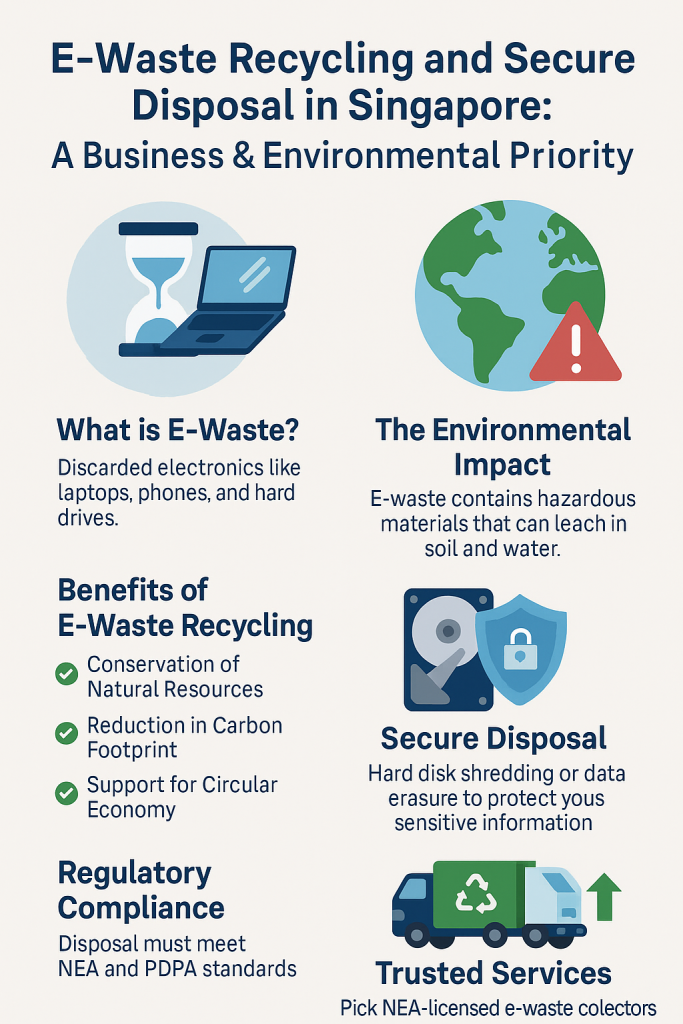In today’s digital age, rapid technological advancement has led to a surge in electronic waste. As devices like laptops, desktops, servers, mobile phones, and IT peripherals become obsolete faster than ever, the need for e-waste recycling and secure disposal in Singapore has become both an environmental necessity and a data protection obligation.
What Is E-Waste?
E-waste (electronic waste) refers to discarded electronic devices and equipment such as:
-
Laptops and desktops
-
Mobile phones and tablets
-
Hard drives and SSDs
-
Printers, monitors, networking gear
These devices often contain hazardous materials and sensitive data, making proper disposal critical from both a health and cybersecurity perspective.
The Environmental Impact of Improper E-Waste Disposal
Many electronic components contain substances like lead, mercury, cadmium, and brominated flame retardants. When dumped into landfills or incinerated improperly, these chemicals can leach into soil and water, harming ecosystems and public health.
According to Singapore’s National Environment Agency (NEA), e-waste is classified as regulated waste, and businesses must follow specific guidelines when disposing of it.
Key Benefits of E-Waste Recycling
Recycling e-waste through certified channels brings major benefits:
-
Conservation of Natural Resources
Valuable materials like gold, silver, copper, and rare earth elements are extracted for reuse. -
Reduction in Carbon Footprint
Recycling electronics requires less energy than producing them from virgin materials. -
Support for Circular Economy
Proper e-waste recycling drives job creation, innovation, and sustainable business practices.
The Importance of Secure E-Waste Disposal
Most e-waste contains sensitive data — from customer records to business contracts stored on hard drives or SSDs. Improper disposal can result in data breaches, PDPA violations, and financial loss.
To ensure complete data protection before recycling:
-
Degaussing: Neutralizes magnetic fields in HDDs, rendering data unreadable
-
Physical Destruction: Shredding or crushing drives to prevent recovery
-
Certified Software Erasure: Using tools compliant with NIST 800-88 standards
🛡 Always choose a NEA-licensed e-waste recycler that offers secure data destruction services before disposal.
Regulatory Compliance in Singapore
Under the Resource Sustainability Act (RSA) and NEA’s e-waste regulations:
-
Businesses are required to dispose of IT equipment through licensed collectors
-
Secure data destruction is expected under PDPA (Personal Data Protection Act)
-
Collectors must submit quarterly reports for traceability
Non-compliance can result in regulatory fines and reputational damage. Working with an accredited ITAD provider ensures your business remains compliant while protecting the environment.
How to Choose a Trusted E-Waste Recycling Service in Singapore
When evaluating an e-waste partner, consider the following:
| Criteria | What to Look For |
|---|---|
| Certifications | NEA license, ISO 9001/14001, BizSAFE, i-SIGMA |
| Data Security | NIST-compliant data erasure or physical shredding |
| Transparency | Audit trail, certificates of erasure/destruction |
| Eco-Friendly Practices | Recycling over disposal, zero-landfill commitment |
The E-Waste Recycling Process (Simplified)
-
Collection & Logistics
Devices are picked up from your premises by licensed handlers. -
Secure Data Erasure
Drives that contain data are wiped, degaussed, or physically destroyed. -
Sorting & Dismantling
Devices are disassembled to separate recyclable components. -
Material Recovery
Reusable metals, plastics, and parts are processed for future use.
How You Can Contribute to E-Waste Recycling
Whether you’re an individual or a business, here’s how you can make an impact:
-
Use approved recycling services for old IT devices
-
Extend device lifespan through repair or upgrades
-
Promote awareness of proper e-waste disposal in your company or community
💡 Tip: If your devices are in working condition, consider working with ITAD providers that offer buy-back or trade-in options — turning retired tech into recovered value.
📞 Need Help with E-Waste Recycling in Singapore?
Arkiva offers certified e-waste recycling and secure disposal services to help businesses meet NEA and PDPA requirements. From hard disk shredding to issuing Certificates of Destruction, we ensure your IT assets are handled responsibly, with full compliance and transparency. We are also an ISO certified company in Singapore.
➡️ Contact us today for a quote or consultation.

